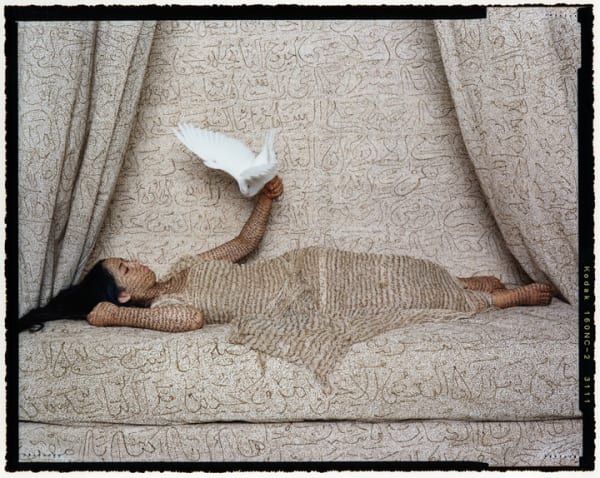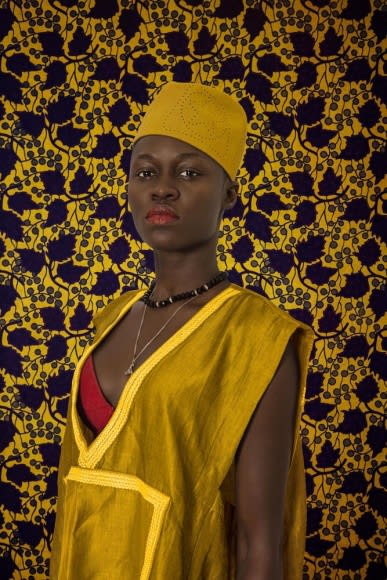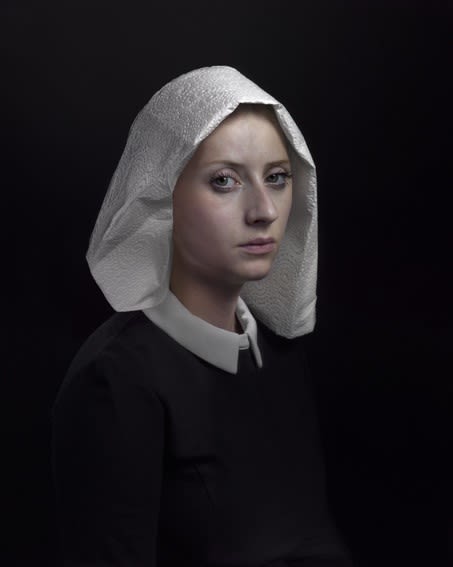Portraiture: A Group Photography Exhibition: Omar Victor Diop, Lalla Essaydi, Hassan Hajjaj, Hendrik Kerstens, Zanele Muholi, and Aïda Muluneh
Jenkins Johnson Gallery, San Francisco is pleased to present Portraiture: A Group Photography Exhibition opening May 5 and running through July 9, 2016. There will be a reception on Thursday, May 5 from 5:30 to 7:30pm. Portraiture features ethnically diverse and world-renowned artists, whose portraits reflect their personal and cultural identity, while also utilizing paint, props, pattern, and the lack thereof to emphasize their subjects. Among the most promising emerging and established artists of today, Portraiture includes Omar Victor Diop, Lalla Essaydi, Hassan Hajjaj, Hendrik Kerstens, Zanele Muholi, and Aida Muluneh. Coinciding with Portraiture is Sally Mann: Emmett, Jessie, and Virginia, an exhibition of intimate family photographs.
Jenkins Johnson Gallery, San Francisco is pleased to present Portraiture: A Group Photography Exhibition opening May 5 and running through July 9, 2016. There will be a reception on Thursday, May 5 from 5:30 to 7:30pm. Portraiture features ethnically diverse and world-renowned artists, whose portraits reflect their personal and cultural identity, while also utilizing paint, props, pattern, and the lack thereof to emphasize their subjects. Among the most promising emerging and established artists of today, Portraiture includes Omar Victor Diop, Lalla Essaydi, Hassan Hajjaj, Hendrik Kerstens, Zanele Muholi, and Aida Muluneh. Coinciding with Portraiture is Sally Mann: Emmett, Jessie, and Virginia, an exhibition of intimate family photographs.
Self-taught Dutch photographer Hendrik Kerstens’ muse is his daughter Paula, who has been his primary subject for over two decades. Photographing Paula in a single space, Kerstens freely explores her as a subject. His early portraits depict the everyday, like Paula standing on a chair ready for swim practice or suffering from a sunburn, which emanated from his paternal need to capture the fleeting essence of her childhood. Recently, Kerstens’ photographs reflect the craftsmanship and lighting of seventeenth century Dutch painted portraiture. With a witty twist, his images create a dialogue between the past and present by utilizing atypical contemporary props that suggest antiquity. In the photograph Bag Paula wears a plastic grocery bag on top of her head; combined with her poised expression and gesture, the lucid quality of the image, and the unmistakable "Dutch" light, the bag instantly becomes a traditional lace hood. Kerstens’ images are widely known, influencing other image-makers and artists. The late Alexander McQueen’s Autumn/Winter 2009 collection paid homage to Bag, and the image was used on the invitation to the fashion show. Kerstens has exhibited at acclaimed institutions around the world including: the National Portrait Gallery, London; the Museum of Photographic Arts (MOPA), San Diego, California; Santa Barbara Museum of Art, California; Erarta Museum, St. Petersburg; the Museum of Contemporary Art, Toronto; and the Whangarei Art Museum, New Zealand, among others. His work is in major public and private collections such as: the Santa Barbara Museum of Art; the Museum of Photography in The Hague; the Sir Elton John Photography Collection, London; and the Alexander McQueen Collection, London.
South African artist and visual activist Zanele Muholi photographs the overlooked and discriminated LGBTI community in South Africa and beyond. The exhibition features portraits from her series Faces and Phases, which brings to light the importance of the African LGBTI community. With no anti-hate legislation in the country, many rapes and assaults on black lesbians are neglected and unprosecuted; Muholi’s goal is to create a visual archive of positive imagery through portraiture that expresses their existence and resistance. Muholi co-founded the Forum for the Empowerment of Women (FEW) in 2002 and founded Inkanyiso, a non-profit organization concerned with visual arts and media advocacy for and on behalf of the LGBTI community in 2009. Muholi co-directed the documentary “Difficult Love” in 2010, which was commissioned by South African Broadcasting Corporation. She has received multiple awards, including: the ICP Infinity Award for Documentary and Photojournalism, 2016; the Fine Prize for the Carnegie International, 2013; the Freedom of Expression award by Index on Censorship, 2013; Campaigner of the Year by Glamour Magazine, 2013; the Casa Africa award for best female photographer, 2009; the Fondation Blachère award at the Rencontres de Bamako biennial of African photography, 2009; the Fanny Ann Eddy accolade from IRN-Africa for her outstanding contributions to the study of sexuality in Africa, 2009; and the Tollman Award for Visual Arts, 2005. Her fellowships and residencies include the BHP Billiton/Wits University Visual Arts Fellowship in 2006, the Thami Mnyele Residency in Amsterdam in 2009, the Ida Ely Rubin Artist-in-Residence at the Massachusetts Institute of Technology in the United States in 2009, and the Civitella Ranieri Fellowship in 2012. In 2015 Muholi exhibited a solo show entitled Isibonelo/Evidence at the Brooklyn Museum in New York. She participated in the group exhibition Re-Significations which coincided with Black Portraiture[s] II: Imaging the Black Body and Re-Staging Histories conference, the sixth in a series of highly successful conferences hosted by New York University and Harvard University. Her work is represented in a number of public collections, including: Museum of Modern Art, New York; Guggenheim, New York; The Art Institute of Chicago, Illinois; and San Francisco Museum of Modern Art, California.
Ethiopian Aida Muluneh’s vibrant photographs express what it is to be an African woman, to encapsulate gender and identity, and to situate it within the colonial experience. Portraiture features Muluneh’s recent photographs from the series The World is 9, which focuses on body painting, inspired by traditional body art from across Africa. These new works express the history and future of Ethiopia, the power struggle for the women who live there, and personal references regarding life and love. Muluneh uses art to promote cultural development through her organization DESTA (Developing and Educating Society Through Art), and she is the founder of the Addis Foto Fest, the first international photography festival in Ethiopia. She is in the permanent collection of the Smithsonian’s National Museum of African Art. Muluneh received the 2007 European Union Prize in the Rencontres Africaines de la Photographie, in Bamako, Mali and was the 2010 winner of the CRAF International Award of Photography in Spilimbergo, Italy. She is currently documenting the Ethiopian drought as a photojournalist for the Washington Post. Aida Muluneh will participate in the 2016 Dakar Biennale.
Moroccan-born, self-taught artist Hassan Hajjaj’s vivid portraits photography combine elements of contemporary fashion and design while addressing issues of consumerism and consumption through the use of high and low brand name recycled materials. Hajjaj moved to London in his teens and was influenced by the club and hip-hop music scenes. His photographs are a fusion of both Marrakesh and London cultures utilizing the colorful repetition of recycled products that reflect the quality of Moroccan mosaics and merging western tailored suits made of regional textiles that his subjects wear. Hajjaj’s work has been exhibited internationally, including at: LACMA, Los Angeles; Newark Museum, New Jersey; Birmingham Museum and Art Gallery, Birmingham, UK; and Victoria & Albert Museum, London, among others. His work is in major public and private collections such as: the Brooklyn Museum, New York; the British Museum, London; the Nasher Museum of Art, Duke University, Durham, NC; the Newark Museum, New Jersey; Los Angeles Museum of Contemporary Art, Los Angeles; the Victoria & Albert Museum, London; the Farjam Collection, Dubai; Institut des Cultures d’Islam, Paris; Kamel Lazaar Foundation, Tunisia; Virginia Museum of Fine Art, Richmond, VA, and more.
Also utilizing highly patterned fabrics and backdrops, the Senegalese self-taught photographer Omar Victor Diop’s portraits capture the diversity of modern African societies through the portraiture of its inhabitants by layering genres, color, and patterns to create stunningly vivid imagery. Grounding his practice in his childhood experiences in Dakar, Diop sites influences ranging from American popular culture (e.g., Michael Jackson) to Arabic music. Diop’s first conceptual project Fashion 2112, The Future of Beauty, featured at the Pan African Exhibition of the African Biennale of Photography of 2011 in Bamako, gained rapid recognition, which led him to committing to photography exclusively. Portraiture features photographs from his series The Studio of Vanities, in which he captures the young entrepreneurs of Africa’s urban culture, including fashion designers, visual artists, and models. The series’ objective is to draw attention to the prospering cultural scene of Dakar, Senegal and to highlight the talented people who are behind this development. Diop thoughtfully selects the backdrops, patterns, and apparel to emphasize his model’s personality and cultural attributions, while also collaborating with the subject on these decisions to portray an accurate portrait of their individuality. Diop recently exhibited in Making Africa at the Bilbao Guggenheim in Spain and was shortlisted for the 2015 Discovery award at the Rencontre d’Arles. He has exhibited his work internationally, including: Witteveen Visual Art Center, Amsterdam; Paris Photo, France; FRAC Aquitaine, France; FIAC’s Officielle Art Fair, France; Louisiana Museum, the Modern Art Museum of Denmark; 1:54 Contemporary African Art Fair, London; Les Rencontres d'Arles, Arles, France; Vitra Design Museum, Germany; and Art Geneva, Switzerland. Omar Victor Diop will participate in the 2016 Dakar Biennale.
Lalla Essaydi has risen to international prominence with her timely and beautiful work that explores the condition of women in Islamic society, cross-cultural identity, Orientalism, and the history of art. Born in Morocco, Essaydi examines the roles of the Muslim woman by incorporating layers of Islamic calligraphy that she applies by hand with henna, in tandem with poses directly inspired by 19th Century Orientalist painting. The subjects of her photographs are often draped in highly patterned fabrics that match the Moroccan architectural ornamentation. Camouflaging her subjects within the background, they become a part of the architecture itself. Essaydi has shown extensively worldwide, and her work was recently featured in a solo exhibition at the San Diego Museum of Art, San Diego, California. She has been featured in The New Yorker, The New York Times, Newsweek, Photo District News, and other publications. Her work is represented in a number of public collections, including: The Louvre Museum, Paris, France; The Art Institute of Chicago; The Museum of Fine Arts, Houston; The Museum of Fine Arts, Boston; the Brooklyn Museum of Art, New York; and the Los Angeles County Museum of Arts (LACMA).
-

Aïda Muluneh
Romance is Dead, 2016
photograph printed on Sunset Hot Press Rag 310 GSM
31 1/2 x 31 1/2 inches
signed on authenticity placard provided by artist
-

Zanele Muholi
Boitumelo Mimie Sepotokele, White City, Soweto, Johannesburg, 2013
gelatin silver print
30 x 20 inches
-

Lalla Essaydi
Les Femmes du Maroc - La Sultane, 2008
chromogenic print
20 x 24 inches
-

Omar Victor Diop
Sashakara, 2016
ink-jet print on Harman by Hahnemuhle paper
35 7/16 x 23 5/8 inches
edition of 5
-

Hendrik Kerstens
Paper Lace, 2015
raw/color negative 4/5 inch ultrachrome
40 x 31 1/2 inches









